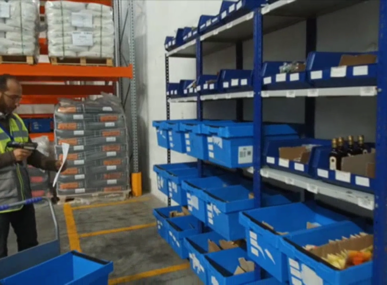From home to the community:
Madanat started her personal anti-littering campaign with herself, changing her own habits with the goal of having — as she terms it — “no plastic in my life.” She started to think twice before buying or throwing anything away, cutting out all single-use plastic items like water bottles. Instead, she uses household water treatment systems, which are more environmentally friendly.
Everything she did purchase needed to be washed and sorted before being handed to a central person in Madanat’s anti-littering campaign. Abu Ali is one of many informal rubbish sorters who comb the trash heaps of West Amman, looking for discarded goods that can be salvaged or converted into something valuable. Abu Ali takes sorted waste from Madanat and sells it to a recycling company to support his family.
For Madanat, people like Abu Ali are “the invisible recycling experts of Jordan.” They create productivity from Jordan’s waste in plain view, but many look down on their profession as disgusting or embarrassing.
Madanat’s broader efforts became more organized when she began coordinating educational programs at Dahiyat al-Hussein, a school in her Amman neighborhood. School principal Aida Arar gave Madanat her full support, sharing the conviction that new attitudes towards waste must start with the next generation.
In Madanat’s courses, students learn about the importance of recycling and how their families’ habits affect the world around them. Her lessons and ideas encourage children to see the fun side of rubbish — for instance, she designed a new bin with basketball hoops above them to make sorting recyclables more enjoyable. This initiative received funding from Aboura Metals Company.
Madanat also introduced children to Abu Ali, which showed them not only that rubbish needs not end up in landfills, but also that there is a very human side to people in Abu Ali’s position. This latter point runs counter to prevailing attitudes in Jordan where, according to Madanat, “we have seen the invisible recyclers with our eyes but not with our hearts.”
Spreading the word:
Eight years into her activist career, Madanat has increasingly branched out on a more ambitious scale. In December 2015, she curated a permanent public waste exhibition at Dahiyat al-Hussein under the umbrella support of the Green Generation Foundation. Syrian designer Khaled Humsi designed the project and received assistance from adult volunteers and the schoolchildren themselves. In Madanat’s words, the display “told the story of man with the earth and its resources.”
Soon after, Madanat produced a documentary film with the help of the Lebanese movie director, Elie Nemri. The film, called “With Myself I Started,” charts her late-in-life resolution to clean up Jordan.
Next year, Madanat wants to start a formal non-profit organization that will help arrange and fund her various initiatives, which are currently paid largely out of her own savings. While the organization’s specific objective has not yet been settled, education will continue to feature prominently.
The Ministry of Education has apparently considered adopting the documentary “With Myself I Started” as a tool to raise awareness about waste management in Jordanian schools. The emphasis on youth sits squarely with Madanat’s view on how Jordan might extricate itself from the — quite literal — mess it has created for itself.
“Education is the most efficient tool to change the next generation, not this generation,” she says firmly. “It’s their future and they must fight for a better one.”
Photos: Courtesy of Amal Madanat.




